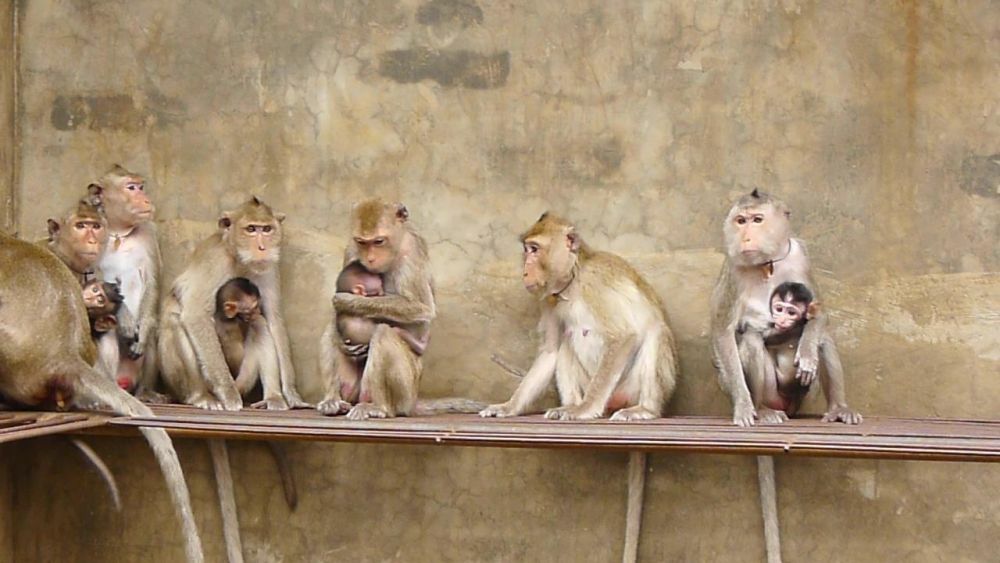
Secret transportation of monkeys for European laboratories revealed
Animal defence organisations have revealed the secret transportation of 240 long-tailed macaques for laboratories on 26 June 2022 from Vietnam to Maastricht in the Netherlands.
Information discovered by animal defence organisations has revealed the secret transportation of 240 long-tailed macaques (Macaca fascicularis) on 26 June 2022 from Vietnam to the Maastricht Airport in the Netherlands, destined for R. C. Hartelust BV, an animal dealer in Tilburg. They provide monkeys to laboratories throughout Europe. The Action for Primates (United Kingdom), Animal Rights (Netherlands), One Voice (France), and Stop Camarles (Spain) associations are campaigning to raise awareness of the cruelty and suffering linked to the trade and transportation of non-human primates for research purposes and toxicity testing.
Photo: Cruelty Free International – Long-tailed macaques in a breeding farm in Vietnam
According to our information, the macaques, costing 4000 dollars (3943 euros) each, were provided by the Thanh Cong company in the Lang Son province and were transported by Easy Charter, a small charter freight company based in Tbilisi. Imprisoned in small individual transport crates, the calvary of monkeys between Hanoi and Maastricht consisted of two international flights lasting thirteen hours, with a 2-hour stopover in Dubai.
Easy Charter’s role in transporting monkeys for laboratories was previously unknown. In June, Air France, the main transporter of monkeys from Mauritius and Vietnam into Europe, announced an end to their involvement in this trade, once its current contracts expired.
Each year, thousands of monkeys are transported around the world for laboratories
The worldwide trade of non-human primates for research purposes is a cruel and brutal activity responsible for the shipping of tens of thousands of animals around the world. Vietnam is a significant exporter of long-tailed macaques for laboratories and primate traders in Europe.
In 2020, the country stated that it had exported 5,378 macaques bred in captivity to Germany (265), Spain (1,186), France (860), and the United Kingdom (178), as well as to the United States (480), Japan (1,814), Singapore (41), and South Korea (41). Hartelust is one of the main commercial traders of primates in Europe. Others include Silabe (Simian Laboratory Europe), a company based in Niederhausbergen linked with the University of Strasbourg in France, and Camarney SL near Barcelona in Spain. Both of these import thousands of long-tailed macaques from Vietnam and Mauritius to sell in laboratories throughout Europe.
Long-tailed macaques, animals in danger
Because of concerns regarding the conservation status of this species, long-tailed macaques have recently been classified as endangered (formerly vulnerable) on the International Union for Conservation of Nature (IUCN) Red List of Threatened Species.
The new assessment of the conservation status of the macaque population, published by the IUCN on 21 July 2022, is based on the levels of exploitation of the species (including worldwide trade of long-tailed macaques for research and experimentation purposes) as well as on the destruction of their habitats which wipes out wild populations. It is estimated that these activities, if they are not reduced during the next three generations (between 36 and 39 years), will lead to a decline bigger or equal to half the size of the current population.
We are understandably very concerned about the impact of the capture of monkeys for breeding purposes on wild macaque populations. For a very long time, we have been equally worried about trafficking and challenge the legitimacy of monkey breeders’ claims (captured and subsequently bred in captivity) throughout the entirety of South-East Asia.
Invasive tests imposed on macaques
In 2019 (the most recent data available), 7,475 non-human primates were used for the first time in research in the EU, of which the majority (6,748) were long-tailed macaques; while this figure does not include non-human primates used or killed to obtain blood, tissue, or organs. The long-tailed macaque is the species of non-human primate that is most commercialised and most widely used by the global research industry and in toxicity testing (poisoning), including in Europe.
Toxicity testing is carried out to evaluate undesirable reactions to medications or chemical products, mainly with the aim of developing commercial products for humans. The monkeys are immobilised and medications are generally administered intravenously (into the bloodstream), subcutaneously (under the skin), or with a tube that is forced into their mouth to reach the stomach. Tests such as these involve immense suffering and can lead to vomiting, convulsions, weight loss, internal bleeding, organ failure, and even death.
Act with us!
- If you are an EU citizen, you can write to your Member of the European Parliament (you can find the contact details of the French MEPs here) to report your concerns about the importation and use of non-human primates for research.
- Sign the petition started by Animal Rights (choose “Andere” in the list of countries)
- Write politely to Mark Rutte, the Dutch Prime Minister: https://www.government.nl/cont…
- Write to Easy Charter to ask that the freight company stops transporting monkeys destined for research and testing: office@easycharter.ge
Translated from the French by Joely Justice